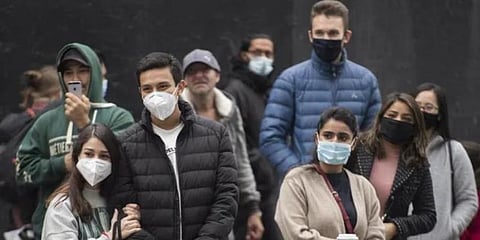

KINGSTON: A city in Canada’s most populous province is limiting gatherings to a maximum of five people in response to the spread of the omicron variant and the variant prompted several regions in Ontario to announce new public health measures on Monday.
The top doctor in region in and around Kingston, Ontario — where community spread of omicron was confirmed — brought in new rules that limit social gatherings to groups of five until at least Dec. 20. He also ordered restaurants to close to indoor dining between 10 p.m. and 5 a.m., stop serving alcohol at 9 p.m. and seat only up to four at a table.
Ontario reported 1,536 new COVID-19 infections Monday and the province’s expert pandemic advisers estimated that omicron now makes up 30% the daily caseload, just weeks after it was first detected. Cases of the variant are doubling every three days.
Canada’s chief public health officer said Canada is expecting a potentially massive surge in COVID-19 cases in the coming weeks, driven by the new omicron variant already spreading through communities. While COVID-19 could be with us for many years to come, Dr. Theresa Tam is optimistic the pandemic could end in the foreseeable future. She foresees a “bumpy ride” this winter, but said Canadians can get through it with increased vaccination, proper testing, public health measures and better treatments for the virus.
In the Kingston, Waterloo and London regions, as well as Toronto, officials announced several new measures aimed at tackling the sharp rise in omicron cases. The moves came as millions of residents between the ages of 50 and 69 became eligible for COVID-19 boosters and health officials examined the possibility of offering third doses to even more cohorts in the fight against the new variant.
Dr. Piotr Oglaza in the Kingston region said the measures, taking effect at 6 p.m. Monday, were being brought in to buy time and get a sense of omicron’s impact before more measures are potentially brought in.
“We are addressing the dire need to break the chain of infection in the highest-risk settings that we’ve seen implicated in the spread of omicron,” he said during a news conference.
Early results indicate omicron already makes up about half the region’s cases, Oglaza said, though current strain on the area’s hospitals — which as of Monday had the province’s highest number of intensive care COVID-19 patients — began earlier, with Delta variant cases.
Dr. Gerald Evans, an infectious disease doctor with Queen’s University in Kingston said there is ``no question″ that omicron will be dominant locally within a week, noting that the region is probably a few days ahead of the rest of the province in terms of case trends.
“If you want to define dominance as anything over 50%, we may very well be there at the moment,” he said.
Dr. Andrew Morris, a professor of infectious diseases at the University of Toronto and the medical director of the Antimicrobial Stewardship Program at Sinai-University Health Network, said there should be no fans at NBA or NHL games in Toronto because of the fast spread of the variant in Ontario.